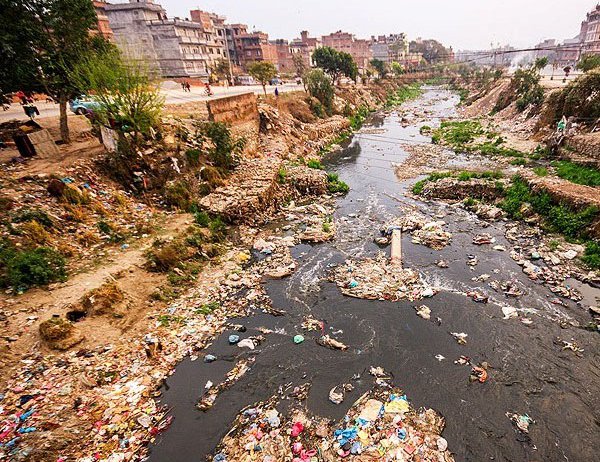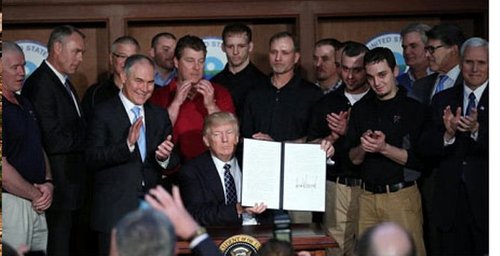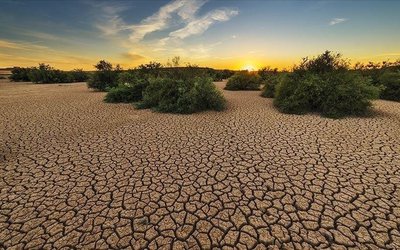
It shouldn’t sound an overrated assertion to state that today’s environmental and ecological disasters are basically man-made events which are essentially caused by human activities or to put it more accurately, incoherent activities. Air, water and soil are being polluted left and right. Many developed and industrialized nations are heavily emitting greenhouse gases day and night. Corporate giants are not performing enough for environmental good in a global scale and rather seem busy lobbying against it. Very little is being done to manage ever growing garbage, air pollution and toxic wastes. Global leadership lacks sufficient initiatives and local level policies are unable to provide adequate scrutiny as well as control, especially in developing countries. This in turn is causing environmental degradation, climate change and chronic health hazards around the world, hence more diseases, disasters, suffering and loss of lives.
Evolution and Environmental Sustainability
The process of evolution supports the fact that the environmental disruption may drive species to extinction. Humans could be responsible for the extinction of the most of the world’s mammals around 14,000 years ago. Could the Homo-sapiens be responsible for the extinction of twelve other human species which coexisted around the same time? Plenty of evidence from the past explains that humans had massive impact on environment since the dawn of modern civilization. European colonialism and imperialism caused impacts by treating nature as mere exploitable resource all around the world. In more recent times, the environment has been greatly affected by the rise of industrialization, with very little sense of nature conservation, sustainable growth and ecological harmony.
Every part of
ecosystem is equally important for every species in it to live and thrive in
harmony, call it environment if you will. Environmental sustainability comes
hand in hand with conservation of ecological systems. There could be numerous
known and unknown factors which help preserve a sound ecological system of
which we humans are just a small part. However, we happen to be greatly
responsible for the loss of biodiversity, various species, forests and wildlife
habitats, causing adverse effects on natural ecosystems beyond the borders. We
consider ourselves to be the most conscious, sane and sensible being on this
planet but we have been constantly intervening with the environment and its
natural harmony by spreading pesticides, herbicides, chemical wastes and
pollutants. 
Although, the theory of evolution argues that only the fittest can survive in this competitive world, it should not be forgotten that the competitive world includes nature as well and also for the evolution to take place we should let the environment make the natural selection and not the other way round. We might be the fittest species on the face of the planet but that surely does not give us the right to disrupt ecological cycles, prevailing here for millennia. Threatening environmental harmony might drive us towards extinction for the nature might choose not to select us after all. Thus environmental conservation and its sustainability should become our collective core imperative today if we really wish to sustain human species on this planet.
Climate Change Threats
Environmental degradation along with increased rate of global warming gave rise to global climate change, an accumulated result of human activities in just over the last few centuries. Although the adverse effects of human on environment may not be clearly seen in day-to-day life, the accumulated impact over the time is quite evident. It may not be local, direct or prompt but the climate change effects are showing up in global scale as weather patterns are changing all over the planet, several species are going extinct, ozone layer is depleting, earth’s temperature is rising, glaciers and polar ice caps are melting rapidly, and sea level is rising faster than ever before.
Nepal’s topography and socio-economic conditions make it one of the highly vulnerable countries to climate change induced disasters. Verisk Maplecroft, a global risks advisory organization, published a Climate Change Vulnerability Index (CCVI) in 2010 ranking Nepal as the fourth most vulnerable country to the impacts of climate change. Recent estimates show that Nepal has already been facing an annual economic loss of 1.5 to 2% of GDP due to climate change events.
According to a report, submitted to the United
Nations Framework Convention on Climate Change (UNFCC), the mean annual
temperature projections for Nepal are 1.3-3.8 degree Celsius by the 2060s and
1.8-5.8 degree Celsius by the 2090s. In the meantime, the World Bank report
indicates that the mean annual temperature of the entire globe is projected to
increase by 1 to 5 degree Celsius by the end of this century, placing us
towards the higher end of the projected range globally. If we don’t handle them
timely and tactfully, climate change threats and its economic impacts certainly
paint rather bleak future for Nepal, as agriculture, hydroelectricity and
water-induced disasters are going to be of greatest concern for us in coming
days. 
The negative impacts of climate change in Nepal have been rapidly translating into reduced annual precipitation, decrease in Himalayan ice reserve, drying up of water resources, rapid formation of glacial lakes, receding glaciers, erratic rainfall pattern, increased threats to run-of-river hydroelectricity projects, etc. As a result, increased risk of disasters, in the form of more frequent avalanches, floods, landslides, droughts, forest fires, epidemics, etc., cannot be ignored anymore.
In regards to climate change threats, major proclamations such as, “Climate change is for real” and “Urgent risk mitigation actions are indispensable” are quite consistent globally. Due to the global nature of the issue, it is impossible to solve the problem by any one nation, organization or a certain group. It requires coordinated participation and collaborative efforts of every possible stakeholder to at least delay, if not stop, our own existential crisis and rescue the planet, we call home.
American (Trump) Tribalism
America, for a long time, had been the largest
environmental polluter in the world, overtaken by China only in recent years.
It is also one of only few countries, which has not yet ratified the Kyoto
Protocol, a United Nations global initiative by 192 countries to reduce
greenhouse gas emissions. In a country with leading global economy where nearly
two-third of the population believes that climate change is real and caused by
humans, it is sad to see that the US President Donald Trump recently signed an
executive order on 28th March 2017 to eliminate Obama's climate change
regulations. However, his wish to renegotiate the UN climate change accord was
immediately dismissed by the countries like France and Germany which have been
strong proponent of the issue. 
In the winter of 2015, nearly 200 countries, including the US, came together in Paris and agreed upon the environmental emission targets covering nearly 90 percent of global greenhouse gas emissions. But now environmental experts around the world are showing concerns that this change of policy in America would make it almost impossible to meet the international pollution targets agreed in December 2015 at the 21st session of the Conference of the Parties (COP21), an international environmental treaty as per the United Nations Framework Convention on Climate Change (UNFCCC) in 1992.
Around two years ago, the Sendai Framework for Disaster Risk Reduction 2015-2030 (Third UN World Conference on Disaster Risk Reduction held in Sendai City of Japan in 2015) made climate change-induced disasters its highest priority, especially in developing countries. The decision was made considering the fact that the countries which contribute least to greenhouse gas emissions are the ones suffering greatest threat of climate change worldwide. Although it seems fairer to focus on mitigating the impacts of climate change in these countries, it doesn’t at all feel encouraging when the so-called global leaders become egocentric and behave with such short-sightedness.
Trump, with deregulation and withdrawal from the COP21 Agreement, hopes to bring coal industry jobs back in the US. He seems to neglect the fact that the country, under the Obama administration, had been gradually creating more and more new jobs in alternative energy sectors, while the coal industry jobs are becoming less and less viable, both environmentally as well as economically.
Unfortunately the President Trump believes that the Paris Agreement empowers some of the other top polluting countries while it hinders American economic growth by crippling its industries. On the contrary, many US Cities, Mayors, States and Company CEOs have long been supporting the cause and are committed to help the US meet the global-emission-targets despite Trump’s withdrawal. The establishment of Regional Greenhouse Gas Initiative (GGGI) program in 2009 was one of such pioneering initiatives undertaken by nine eastern states within the US.
Summary
In the age of globalization, people around the planet, automatically look up to the countries like the US and China and their leaderships to fight borderless disaster threats such as global warming and climate change. As a global hub of technology, economy and advancements, one would naturally expect that the US would set examples and take progressive steps towards clean power plants, renewable energy generation as well as job creation in these sectors. Nevertheless, the reality on the ground is different. The recent development in the US environmental policy landscape totally contradicts the above assumptions.
President Trump certainly needs to consider few good lessons from China which recently pledged to invest over US$350 billion in renewable power, expecting to create over 13 million new jobs by 2020. However, let’s also not forget that we are talking about someone who doesn’t really believe in global warming or its effects on climate. That, quite frankly, is both ridiculous and threatening simultaneously.
The term globalization should imply inclusiveness but the current leadership of the US seems full of prejudices, selfishness and irresponsible acts which completely lack long-term vision and a decent sense of global well-being. This is no less than stepping down to tribalism in the face of globalization and a looming global crisis just round the corner.

Amit K. Shrestha
Shrestha is a freelance Consultant, MS in Risk Control & Safety Management; The author is passionate about the issues involving environment, occupational health, safety and sustainability for the planet, people and profit. Contact Email: OHSNepal@gmail.co
- Preventing Rapid Climate Change: A Hugely Complicated Taskfor Humanity To Tackle
- Oct 29, 2021
- Changing Perception Changes Everything: A Paradigm Shift In Consciousness
- Aug 02, 2021
- Business Continuity Planning And Disaster Recovery: NRB Guidelines For Commercial Banks of Nepal
- Jun 23, 2021
- Fighting Covid-19: Emotional And Mental Wellbeing Of Essential And Frontline Workers
- May 23, 2021
- Fearsome-4 of Construction Industries: Focus on Fatal-Four Hazards
- Jan 27, 2021
















